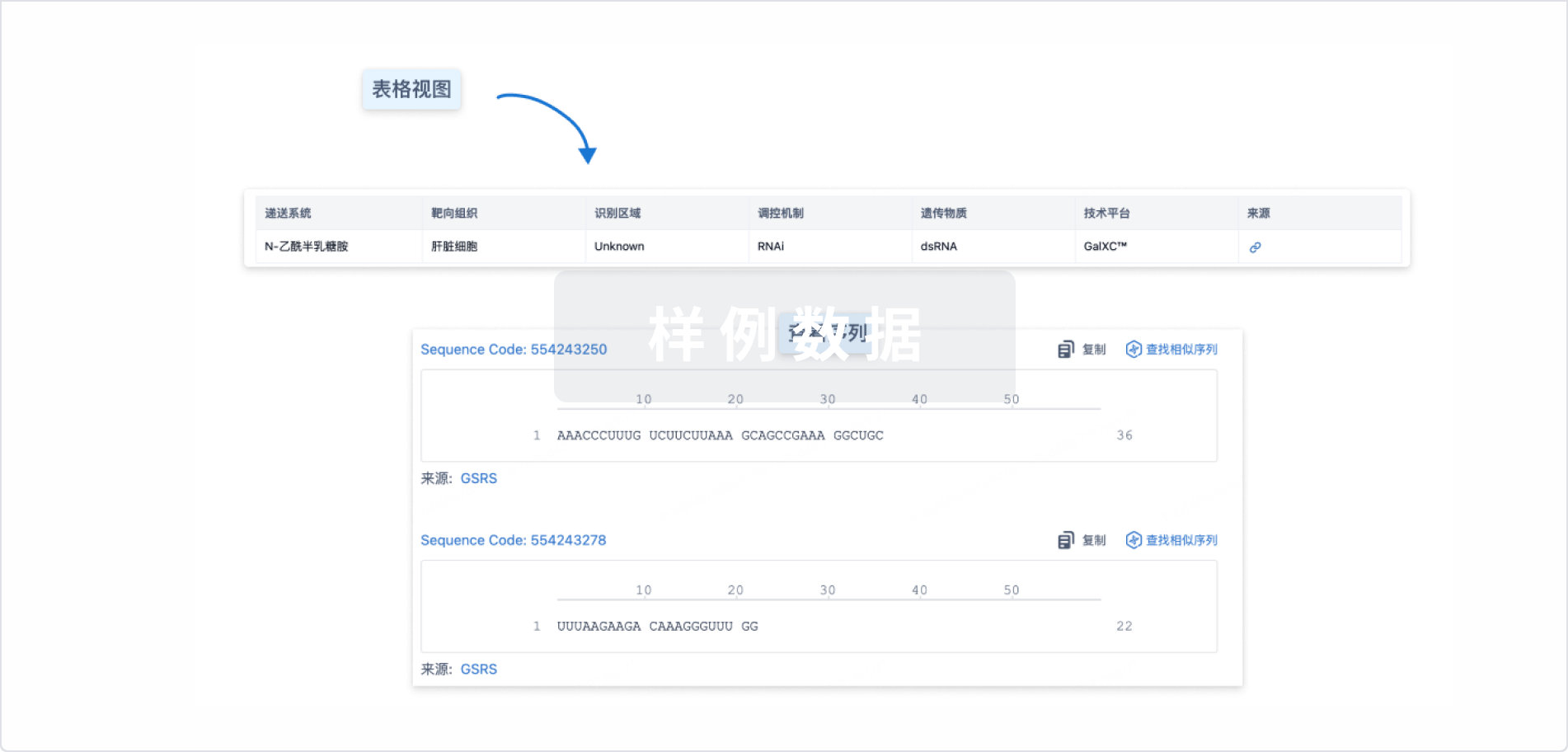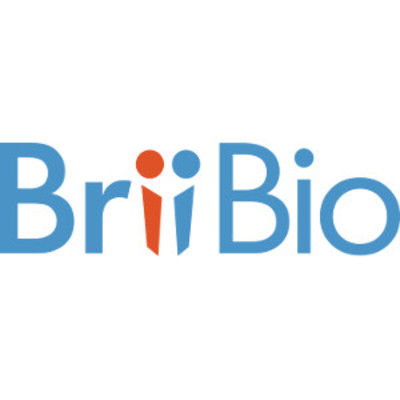预约演示
更新于:2025-10-04
Elebsiran
更新于:2025-10-04
概要
基本信息
非在研机构- |
最高研发阶段临床3期 |
首次获批日期- |
最高研发阶段(中国)临床2期 |
特殊审评突破性疗法 (美国)、快速通道 (美国)、孤儿药 (欧盟)、优先药物(PRIME) (欧盟)、突破性疗法 (中国) |
登录后查看时间轴
结构/序列
使用我们的RNA技术数据为新药研发加速。
登录
或

Sequence Code 286629921

来源: *****
Sequence Code 1191632800

来源: *****
关联
22
项与 Elebsiran 相关的临床试验NCT07142811
A Phase 2b Randomized, Open-Label Study to Evaluate the Efficacy and Safety of Tobevibart+Elebsiran Combination Therapy Versus Bulevirtide in Participants With Chronic HDV Infection (ECLIPSE 3)
A Study to Evaluate Tobevibart+Elebsiran versus Bulevirtide in Chronic HDV Infection
开始日期2025-08-05 |
申办/合作机构 |
NCT07128550
A Phase 3 Randomized, Open-Label Study to Evaluate the Efficacy and Safety of Tobevibart+Elebsiran Combination Therapy in Participants With Chronic HDV Infection Not Virologically Suppressed With Bulevirtide (ECLIPSE 2)
This is a multicenter, open label, randomized Phase 3 clinical study to evaluate tobevibart + elebsiran in participants with Chronic HDV Infection not virologically suppressed with bulevirtide
开始日期2025-07-30 |
申办/合作机构 |
ACTRN12625000416493
A Phase 3 Randomized, Open-Label Study to Evaluate the Efficacy and Safety of Tobevibart+Elebsiran Combination Therapy in Participants with Chronic HDV Infection (ECLIPSE 1)
开始日期2025-05-29 |
申办/合作机构 |
100 项与 Elebsiran 相关的临床结果
登录后查看更多信息
100 项与 Elebsiran 相关的转化医学
登录后查看更多信息
100 项与 Elebsiran 相关的专利(医药)
登录后查看更多信息
7
项与 Elebsiran 相关的文献(医药)2025-07-01·GASTROENTEROLOGY
The Impact of Hepatitis B Surface Antigen Reduction via Small Interfering RNA Treatment on Natural and Vaccine (BRII-179)-Induced Hepatitis B Virus-Specific Humoral and Cellular Immune Responses
Article
作者: Ma, Haiyan ; Tan, Ying ; Lee, Ariel ; Bertoletti, Antonio ; Chen, Jieliang ; Wang, Bing ; Zhu, Chong ; Lai-Hung Wong, Grace ; Li, Dong ; Douglas, Mark W ; Ji, Yun ; Chen, Xiaofei ; Yuen, Man-Fung ; Lv, Jianxiang ; Zhu, Qing ; Le Bert, Nina
BACKGROUND & AIMS:
The impact of hepatitis B surface antigen (HBsAg) reduction from small interfering RNA (siRNA) treatments on hepatitis B virus (HBV)-specific immunity of individuals with chronic hepatitis B (CHB) has not been adequately analyzed in humans. We conducted a phase 2a study treating CHB participants with nine 4-weekly doses of HBV-targeted siRNA elebsiran (BRII-835), either alone (n = 10) or in combination with a virus-like particle-based therapeutic vaccine (BRII-179) containing Pre-S1, Pre-S2, and S antigens, coadministered with (n = 39) or without (n = 41) interferon alfa.
METHODS:
We analyzed longitudinally for 72 weeks virologic, clinical, and immunologic parameters, including HBsAg, alanine aminotransferase, hepatitis B surface antibody (anti-HBs), the neutralizing activity of representative sera, and frequency and cytokine secretion ability of T cells specific for Pre-S1, Pre-S2, and S both directly ex vivo and after in vitro expansion.
RESULTS:
Combination therapy with elebsiran and BRII-179 was well tolerated. Although no sustained HBsAg seroclearance or notable difference in mean HBsAg reduction at the group level was observed, we detected marked heterogeneity in immunologic responses among groups. HBsAg reduction mediated by siRNA alone was associated with minimal HBV-specific immune response recovery. In contrast, combination of elebsiran with BRII-179 induced a significant modification of immune responses demonstrated by anti-HBs antibody production and an expansion of interleukin 2-producing helper T cells specific for Pre-S1/Pre-S2 antigens only. Importantly, anti-HBs antibodies persisted at ≥100 IU/L in ∼40% of the participants for at least 32 weeks after combined treatment. Moreover, the neutralizing ability of the anti-HBs-positive sera was associated with HBsAg reduction.
CONCLUSIONS:
siRNA-induced HBsAg reduction may contribute to the persistence and efficacy of the humoral arm of HBV-specific adaptive immunity in CHB participants receiving the therapeutic vaccine BRII-179.
CLINICALTRIALS:
gov number: NCT04749368.
2025-06-01·JHEP Reports
Therapy with murinized tobevibart and elebsiran is efficacious in a liver-chimeric mouse model of HDV infection
Article
作者: Terrell, Ashley N ; Lempp, Florian A ; Zhou, Jiayi ; Puschnik, Andreas S ; Corti, Davide ; Rocha, Evelyn ; Kaiser, Hannah ; Purcell, Lisa A
Background & Aims:
Chronic hepatitis delta virus (HDV) infection represents the most severe form of viral hepatitis. HDV is a satellite virus of hepatitis B virus (HBV) and depends on the hepatitis B surface antigen (HBsAg) for envelopment and viral entry. Tobevibart (VIR-3434) is an investigational monoclonal antibody targeting the antigenic loop of HBsAg. Elebsiran (VIR-2218) is an investigational RNAi therapeutic targeting a highly conserved region within the HBV genome. The aim of this study was to investigate the antiviral effect of tobevibart and elebsiran on HDV infection in preclinical models.
Methods:
In vitro antiviral activity was determined in an HBV/HDV coinfection model in primary human hepatocytes (PHHs) or Huh7-NTCP cells. The in vivo efficacy of a murinized version of tobevibart alone or in combination with elebsiran was evaluated in HBV/HDV-coinfected liver-chimeric mice.
Results:
Elebsiran treatment reduced levels of secreted HBsAg and infectious HDV with picomolar potency. Tobevibart exhibited pan-genotypic neutralizing activity against all tested HDV genotypes with EC50 ranging from 1.1 to 4.6 ng/ml. Combination treatment with tobevibart and elebsiran reduced infectious HDV levels in HBV/HDV-coinfected PHHs in an additive manner. In vivo, compared to vehicle, treatment with elebsiran, murinized tobevibart, or their combination significantly decreased HDV RNA serum levels by 0.7 log (p <0.0001), 1.6 log (p = 0.0034) and 2.1 log (p = 0.0002), respectively (measured at day 14 for elebsiran or day 21 for murinized tobevibart and the combination). HBsAg serum levels were reduced by 0.6 log (p <0.0001), 2.0 log (p <0.0001) and 2.8 log (p <0.0001), respectively.
Conclusions:
Tobevibart and elebsiran exert potent antiviral activity as single agents and in combination. The data support the clinical development of tobevibart and elebsiran for the treatment of patients with chronic HDV infection.
Impact and implications:
Chronic hepatitis delta is the most severe form of viral hepatitis and is associated with rapid progression of liver-related diseases and a high risk of hepatocellular carcinoma development. To date, there are only limited treatment options available. Tobevibart and elebsiran are currently being evaluated in clinical trials for the treatment of HDV (phase III) and for the treatment of HBV (phase II). The current study demonstrates that tobevibart and elebsiran are efficacious in preclinical models of HBV/HDV coinfection, supporting their clinical development.
2024-12-01·Lancet Gastroenterology & Hepatology
VIR-2218 (elebsiran) plus pegylated interferon-alfa-2a in participants with chronic hepatitis B virus infection: a phase 2 study
Article
作者: Lim, Tien-Huey ; Yuen, Man-Fung ; Gane, Edward ; Cloutier, Daniel ; Yoon, Ki Tae ; Gupta, Sneha V ; Arizpe, Andre ; Lim, Young-Suk ; Mao, Shenghua ; Heo, Jeong ; Thanawala, Vaidehi ; Cathcart, Andrea L ; Hwang, Carey ; Tak, Won Young ; Tangkijvanich, Pisit
BACKGROUND:
Chronic hepatitis B virus (HBV) remains a global concern, with current treatments achieving low rates of HBsAg seroclearance. VIR-2218 (elebsiran), a small interfering RNA agent against HBV transcripts, reduces HBsAg concentrations. We aimed to evaluate the safety and antiviral activity of VIR-2218 with and without pegylated interferon-alpha-2a treatment in participants with chronic HBV.
METHODS:
This open-label, phase 2 study was conducted at 23 sites in six countries (New Zealand, Australia, Hong Kong, Thailand, South Korea, and Malaysia). Adults (aged 18-65 years) with chronic HBV infection without cirrhosis and with HBsAg more than 50 IU/mL and HBV DNA less than 90 IU/mL who were on continued nucleoside or nucleotide reverse transcriptase inhibitor (NRTI) therapy for 2 months or longer were eligible. Participants were enrolled into one of six cohorts to receive VIR-2218 200 mg subcutaneously every 4 weeks, with or without 180 μg subcutaneous pegylated interferon-alfa-2a once per week. Cohort 1 received six doses of VIR-2218 (total 20 weeks); cohort 2 received six doses of VIR-2218 starting at day 1, plus 12 doses of pegylated interferon-alfa-2a starting at week 12 (total 24 weeks); cohort 3 received six doses of VIR-2218 and 24 doses of pegylated interferon-alfa-2a (total 24 weeks); cohort 4 received six doses of VIR-2218 and up to 48 doses of pegylated interferon-alfa-2a (total 48 weeks); cohort 5 received up to 13 doses of VIR-2218 and up to 44 doses of pegylated interferon-alfa-2a (total 48 weeks); and cohort 6 received three doses of VIR-2218 and 12 doses of pegylated interferon-alfa-2a (total 12 weeks). The primary endpoints were the incidence of adverse events and clinical assessments (including results of laboratory tests). Secondary endpoints were the mean maximum reduction of serum HBsAg at any timepoint; the proportion of participants with serum HBsAg seroclearance at any timepoint and for more than 6 months after the end of treatment; and the proportion of participants with anti-HBs seroconversion at any timepoint. For patients who were HBeAg-positive, we also assessed the proportion with HBeAg seroclearance or anti-HBe seroconversion at any timepoint. This study is registered with ClinicalTrials.gov, NCT03672188, and is ongoing.
FINDINGS:
Between July 2, 2020, and Nov 2, 2021, 124 individuals were screened for eligibility, 84 of whom were enrolled (15 in cohort 1, 15 in cohort 2, 18 in cohort 3, 18 in cohort 4, 13 in cohort 5, and five in cohort 6). Participants were predominantly HBeAg-negative, Asian, and male (66 [79%] participants were male and 18 [21%] were female). Most treatment emergent adverse events were grades 1-2. Three (20%) participants in cohort 1, four (27%) in cohort 2, eight (44%) in cohort 3, seven (39%) in cohort 4, six (46%) in cohort 5, and two (40%) in cohort 6 reported treatment-emergent adverse events related to VIR-2218. 12 (80%) participants in cohort 2, 12 (67%) in cohort 3, 14 (78%) in cohort 4, 13 (100%) in cohort 5, and three (60%) in cohort 6 reported treatment-emergent adverse events related to pegylated interferon-alfa-2a. Two (13%) participants in cohort 1 had elevations in alanine aminotransferase, compared with 13 (87%) participants in cohort 2, 15 (83%) in cohort 3, 17 (94%) in cohort 4, 11 (85%) in cohort 5, and three (60%) in cohort 6. The mean maximum change from baseline at any timepoint in HBsAg concentration was -2·0 log10 IU/mL (95% CI -2·1 to -1·8) in cohort 1, -2·2 log10 IU/mL (-2·5 to -1·8) in cohort 2, -2·5 log10 IU/mL (-2·8 to -2·1) in cohort 3, -2·4 log10 IU/mL (-3·1 to -1·8) in cohort 4, -3·0 log10 IU/mL (-3·7 to -2·3) in cohort 5, and -1·7 log10 IU/mL (-2·1 to -1·4) in cohort 6. 11 participants (one in cohort 2, one in cohort 3, five in cohort 4, and four in cohort 5) receiving VIR-2218 plus pegylated interferon-alfa-2a had HBsAg seroclearance at any timepoint. Of these, ten (91%; one in cohort 2, five in cohort 4, and four in cohort 5) had anti-HBs seropositivity. Six participants (one in cohort 2, three in cohort 4, and two in cohort 5) had sustained HBsAg seroclearance through to 24 weeks after the end of treatment. No participants receiving VIR-2218 monotherapy (cohort 1) or VIR-2218 plus pegylated interferon-alfa-2a 12-week regimen (cohort 6) had HBsAg seroclearance. 12 (42%) of 26 participants (one of four in cohort 1, two of six in cohort 2, four of seven in cohort 3, four of six in cohort 4, and one of three in cohort 5) who were HBeAg positive at baseline had HBeAg seroclearance or anti-HBe seroconversion.
INTERPRETATION:
The results of this phase 2 study support further development of VIR-2218 as a potential therapy for patients with chronic HBV infection. Additional clinical trials of VIR-2218 with and without pegylated interferon-alfa-2a in combination with an HBsAg-targeting monoclonal antibody are ongoing.
FUNDING:
Vir Biotechnology.
242
项与 Elebsiran 相关的新闻(医药)2025-10-03
国内目前做感染的biotech特别少,HBV在国家的疫苗接种计划大背景下未来肯定是越来越少的,现在的是市场主要是存量市场。
腾盛博药以“感染性疾病+中枢神经系统(CNS)”双赛道为核心,采用“自研+引入”混合模式,目标是在大中华区及全球实现First-in-Class/ Best-in-Class的功能性治愈或长效疗法。
重点管线进展
1. 功能性治愈HBV(最高优先级)
腾盛博药拥有国内最系统、最多机制互补的HBV组合,三项关键IIb研究(ENSURE/ENRICH/ENHANCE)预计2026年上半年读出完整数据,届时将决定首个注册性III期方案。
- BRII-179(治疗性疫苗)
– 机制:重组HBV表面抗原+CpG1018佐剂,唤醒/放大宿主HBsAg特异性免疫。
– 里程碑:ENSURE研究队列4显示,对BRII-179产生抗-HBs应答者,48周HBsAg血清清除率达61%(11/18),远高于无应答者10%;其中91%维持抗-HBs≥100 IU/L。公司已收购该资产全部IP,省去未来里程碑及销售分成。
- elebsiran(BRII-835,siRNA)
– 机制:RNAi靶向HBV转录本,快速降低HBsAg水平,为免疫重建“开窗”。
– 现状:与PEG-IFNα联用的ENSURE主队列已完成;新三联队列(elebsiran+BRII-179+短程PEG-IFNα)2025年7月入组结束,预计2026Q1揭盲。
- tobevibart(BRII-877,中和单抗)
– 机制:被动免疫+阻断HBV新感染循环;与elebsiran构成“siRNA+单抗”去抗原化策略。
– 现状:由合作伙伴Vir主导的两项IIb(与elebsiran±PEG-IFNα)进行中,预计2025年底完成随访。
临床策略解读:公司提出“先富集-再治愈”路径——用BRII-179筛出可产生足够抗-HBs的免疫应答者,再给予siRNA/单抗/干扰素组合,提高功能性治愈率并降低无效暴露。若2026年数据复制ENSURE队列4水平,有望支持2026Q3进入全球多中心III期,国内申报亦将同步。
2. 多重耐药革兰阴性菌感染
- BRII-693(soralimixin,新型多黏菌素衍生物)
– 亮点:对碳青霉烯耐药鲍曼不动杆菌、铜绿假单胞菌保持低MIC90,肾毒性显著低于传统多黏菌素B/E。
– 进展:2025年与健康元达成大中华区独占许可,腾盛博药收取首付+里程碑+双位数销售提成,保留欧美权益;I期剂量递增已完成,计划2025Q4启动国际II期。
– 竞争格局:全球仅3款新型多黏菌素类在临床(含本品),FDA QIDP资格已获,有望享受优先审评。
3. HIV长效维持治疗——寻求外部合作
- BRII-732(口服衣壳抑制剂)+ BRII-753(长效RT抑制剂)
– 目标:每4周1次口服或注射维持,替代每日口服。
– 进展:已完成I期健康人PK/安全试验,数据显示753半衰期240h,支持月度给药;因资源聚焦HBV,公司正在寻找全球大型HIV玩家共同开发/转让。
– 市场:全球HIV维持市场>160亿美元,每延长1周给药间隔可提升依从性3-5%。
未来挑战和催化剂
HBV功能性治愈领域“概念验证”到III期失败率仍高;若2026年三联方案整体HBsAg清除率低于30%或停药后复发率>50%,估值将大幅回调。
依赖外部合作:HIV、CNS、抗生素后续开发均需要借力Big Pharma或国内药企,自主商业化能力尚未验证。
国内医保对创新抗生素支付意愿有限,BRII-693若仅获批大中华区,峰值可能受限;HBV治愈方案如定价>10万元/疗程,需面对惠民保、商业保险的补充。
催化剂:
2025Q4:elebsiran+tobevibart±PEG-IFNα IIb初步数据
2026Q1:ENHANCE三联队列48周HBsAg清除率揭盲
2026Q2:ENRICH研究最终分析及III期设计沟通(中国与EMA/FDA)
2026H1:BRII-693国际多中心II期首例给药 & 美国QIDP资格更新
未来展望:
腾盛博药是国内唯一同时握有“siRNA+治疗性疫苗+中和抗体”三大不同机制HBV资产的公司,可自由组合成多条注册路径,提高成功概率。ENSURE/ENRICH/ENHANCE三项IIb同步推进,入组速度领先同行;腾盛博药几乎已把全部筹码押注在“HBV功能性治愈”赛道,2026年上半年将成为公司命运的“分水岭”。若ENSURE/ENHANCE能够复制>50%的HBsAg血清清除且24周不复发,公司有望跻身全球HBV治愈第一梯队,并吸引跨国药企共同III期或整体并购;反之,则面临管线重估与现金消耗双重压力。
对产业方而言,腾盛博药在siRNA与免疫疗法组合上的中国权益与临床数据库具备战略价值,是Big Pharma补齐HBV管线或区域头部药企进军全球创新的潜在标的。
临床3期siRNA疫苗优先审批并购
2025-09-04
·研发客
Citeline首席分析师周淑华发言
圆桌现场
研发客主编毛冬蕾与张江全互动
张金晶 威斯津生物合伙人商务发展总监
李安康 腾盛博药CFO
尹思远 传信生物首席运营官
王松立 星核迪赛研发总监
陈进 维亚臻生物临床药理&转化医学副总裁
高璐 圆因生物CEO
张震 徕博科亚太商务开发高级总监
Simon Yu 徕博科中国中心实验室运营总监
研讨会现场图片分享
舶望制药近日与诺华制药就4款小核酸药物达成1.6亿美元预付款的消息,再次证明小核酸药物成为备受关注的热门赛道。全球众多企业布局,中国一批“黑马”公司正凭借独特的技术平台和差异化的管线布局悄然崭露头角。在由研发客与徕博科联合举办的“中国分子,世界引擎”研讨会上,该领域的发展前景成为焦点。
拓展阅读
舶望再度授权诺华siRNA药物,总交易价值达52亿美元!
李勇:在心血管疾病领域前景广阔
复旦大学华山医院心脏科李勇教授认为,小核酸药物在心血管疾病防治领域正展现出较大潜力。英克司兰(Inclisiran)的成功获批,验证了这一领域的重要性。
小核酸药物在递送系统方面取得了进展。除了目前已经广泛应用的肝细胞递送系统外,通过优化递送载体,科学家已实现了对卵巢细胞、肾脏细胞及脑细胞的有效靶向递送。李勇教授认为,针对脑细胞的靶向递送技术有望在短期取得突破,这为小核酸药物在心血管神经系统疾病的应用提供了可能。
复旦大学华山医院心脏科 李勇教授
心血管疾病如高血压、血脂异常和糖尿病等,多为慢性病,不仅在中国,在全球也有数以亿计的大量患者,而且需要长期维持治疗。李勇教授指出:“糖尿病患者中45%的死亡与心血管疾病相关,而非高血糖本身。慢性肾脏病患者进入透析后,无论在是否已经接受透析治疗,心血管事件也是其首要死因,占比超40%。近10年来越来越受关注的脂肪肝,已经超越消化系统,与糖尿病及慢性炎症密切关联,也会导致心血管疾病风险增高。因此,维护心血管健康是内科疾病防控预防和管理的关键策略。”
“心血管事件链”概念于1991年由美国医学科学院院长魏德照Victor Dzao提出,强调从危险因素发展为冠心病、心衰的连续过程中的全程疾病管理及危险因素控制。李勇教授解释,高血压、糖尿病和血脂异常是三大主要危险因素,它们通过激活体内RAAS、炎症、能量/线粒体代谢等某些系统,促使动脉粥样硬化斑块形成和发展、以及心肌、肾脏、血管的纤维化加速进展。
关于高血压,他表示:“高血压不仅造成物理损伤,还会激活某些系统,引起左心室肥厚和舒张功能障碍。中国高血压患者众多,每年约260万人因高血压而此死亡,我国的高血压人口数和死亡人数均居全球之首。目前美国诊断标准为130/80 mmHg,而中国仍采用140/90 mmHg,这在一定程度上影响了防控效果。”
在血脂方面,他说:“LDL-C是动脉粥样硬化的主要致病性危险因素,根据我国著名心血管流行病学家北京安贞医院赵冬教授团队15年的队列研究数据,其升高对心肌梗死风险的贡献达77%。大量随机对照临床试验证实,显著降低LDL-C水平不仅能是防治心血管病的关键,还能降低全因死亡,延长寿命。”对于糖尿病与脂肪肝,他强调这两类患者的心血管风险增加,脂肪肝患者尤其易合并心血管疾病,导致临床结局恶化,建议心血管医生应更多关注这类人群的心血管健康。
在血脂管理方面,他特别提到英克司兰(Inclisiran):“作为一种靶向PCSK9的小干扰RNA药物,英克司兰通过阻断PCSK9与LDL受体的结合,增加肝细胞表面LDL受体的数量,提升肝细胞清除LDL-C的能力,从而降低血中的LDL-C水平。其独特之处在于,一次注射可维持长达6个月的疗效,大大提高了患者的治疗依从性。临床试验表明,英克司兰单药治疗或与他汀联用,均可降低LDL-C幅度高达水平60%,且安全性良好。”
他还介绍了其他小核酸药物的研究进展:“除了英克司兰外,针对甘油三酯(TG)和脂蛋白(a) [Lp(a)]的小核酸药物也展现出广阔的应用前景。例如,针对ApoC-III的小核酸药物Plozasiran、针对ANGPLT-3的Zodasiran可降低TG水平,并减少急性胰腺炎的发作风险;除了Plecarsen外、多个针对Lp(a)的小核酸药物如Olpasiran、Lepodisiran则可降低其水平达90%以上,有望减少心血管事件的发生。”
在强化降压与降脂治疗的临床意义方面,李勇教授表示:“近年来,多项大规模临床试验表明,将血压控制在更低水平(如收缩压<120 mmHg)可降低心血管事件和死亡率。然而,中国的高血压管理目标值仍为140/90 mmHg,这在一定程度上限制了降压治疗的获益。因此,推动高血压管理目标的下调,对于改善中国心血管疾病防治现状具有重要意义。”小核酸药物在降压领域也有明显的进展,Zilebesiran的II期临床试验显示,每6月一次皮下注射,可获得令人相当满意的降压效果,针对高血压患者的心血管结局随机对照临床试验(CVOT)ZENITH研究已经启动。
他还强调了早期降脂治疗的重要性:“LDL-C的累积暴露时间与动脉粥样硬化的发展密切相关。因此,越早启动降脂治疗并维持较低水平,对心血管的保护作用越大。小核酸药物的出现,为实现长期、稳定的降脂治疗提供了新的手段。”
最近,Lancet发表了小核酸药物用于治疗脂肪肝的II期临床试验结果,ION224-CS2试验表明,采用肝活检来评估,寡核苷酸制剂抑制DGAT-2,能够有效逆转脂肪肝,安全性良好。
展望未来,李勇教授认为小核酸药物在一级预防和多靶点治疗方面具有广阔前景。然而,李勇教授也指出了小核酸药物面临的挑战:例如,如何进一步提高递送效率、降低脱靶效应、优化给药方案等。此外,加强医生和患者对小核酸药物的认知也是推动其应用的关键。
最后,他总结道:“小核酸药物为心血管疾病防治带来了新希望。通过不断优化技术、拓展适应症和加强临床应用研究,相信小核酸药物将在未来心血管疾病防治中发挥越来越重要的作用。”
周淑华:全球核酸药物研发持续活跃
Citeline首席分析师周淑华博士介绍了2025年全球核酸药物研发持续活跃的态势。
Citeline首席分析师 周淑华博士
截至2025年,全球处于活跃开发阶段的药物总数达23,875种,较上一年度增长4.6%,新增药物1,050种,其中4,546种为新加入研发管线的药物。新增药物中,抗癌药占比38.8%,神经系统疾病药物占13.8%。各临床阶段药物数量均增长,Ⅰ期增长6.8%,Ⅱ期增长6.3%,Ⅲ期增长8.8%,临床前研究阶段增长1.8%(低于2024年的5.5%),显示全球研发活跃但临床前研究增速放缓。
核酸药物研发管线中,肿瘤学仍是最大治疗领域,2025年有9,746种药物在研,增长3.7%,占所有在研药物的39.7%(略低于2024年的40.1%)。神经系统疾病药物研发增长率低于平均水平(2024-2025年仅增长4.2%)。顶尖企业中,辉瑞重新夺回研发管线规模榜首,罗氏和诺华紧随其后。前十家企业贡献5.4%的在研药物,前25家贡献10.0%,剩余19.4%来自仅有一两种药物在研的公司。
疾病聚焦方面,乳腺癌仍是研发重点,管线规模增长9.5%,领先于非小细胞肺癌(NSCLC,增长10.0%)。非癌症领域中,新冠病毒退出前十,阿尔茨海默病仍是唯一进入前十的非肿瘤疾病。肥胖治疗药物研发增长43.3%(受Wegovy和Mounjaro等药物影响)。热门药物蛋白靶点中,免疫疗法(I-O)相关靶点主导,CD3e连续第二年位居榜首,EGFR取代Her-2成为第二位热门靶点(应用于多种癌症治疗)。
全球及中国研发合作趋势显示,全球范围内16%的在研药物处于合作研发状态(抗癌药物领域16%,神经系统疾病药物16%,抗感染药物14%,消化/代谢系统疾病药物17%)。2017-2025年,中国合作交易数量和总金额2025年分别达16.4%和33.7%,但首付款比例普遍低于全球水平。
“未来,全球核酸药物研发将持续活跃,中国企业增长势头强劲。中国企业需提升创新效率、加强全球市场洞察、完善内部管理并构建健全的资本体系,以实现可持续发展。”周淑华说。
张江全:小核酸药物非临床安全评价要点
徕博科中国区早期研发负责人张江全剖析了小核酸药物非临床安全评价要点。
在结构与修饰上,siRNA药物可进行多种修饰,这会影响其药代动力学,免疫原性特性和毒性表现,介绍了非临床监管、药代动力学以及免疫原性三个方面的内容。
徕博科中国区早期研发负责人 张江全
小核酸药物的非临床监管主要遵循 ICH M3(R2)原则,标准遗传毒组合试验,一般毒性、DART、致癌性研究使用两种种属,同时需考虑ICH S6 指南部分终点。考虑到siRNA的临床给药周期,重复给药毒性研究周期较长,啮齿类动物 6 个月、非人灵长类 9 个月,对此,多国监管机构有相关原则。
在药代动力学方面,siRNA血浆半衰期短,快速被肝脏摄取,导致PK/PD分离现象。siRNA主要分布于肝脏且在肝组织中半衰期较长,肝脏药代动力学和RNA诱导沉默复合体(RISC)药代动力学是决定药效动力学及其持续时间的关键因素。免疫原性的潜在来源包括有序列依赖性免疫激活、递送系统影响等。
对于动物研究的毒性特征,包括免疫原性相关毒性,通过非 Toll 样受体途径触发促炎细胞因子释放;杂交依赖性毒性有靶点效应、脱靶效应、RNAi 机制饱和等;递送载体毒性方面,各种载体存在各自不同的毒性特征。
此外,张江全还分享了两个案例。一是已报道的SLN360案例,GalNAc结合的siRNA,靶向脂蛋白a mRNA,用于心血管疾病。研究通过GalNAc- 去唾液酸糖蛋白受体(ASGPR)结合实现肝脏特异性递送,旨在降低PLA,进行体外特异性和效力研究、体内生物分布研究(大鼠/食蟹猴)以及29天GLP毒性研究。结果显示,大鼠在不同剂量下,高剂量雌性大鼠体重略有下降,其他方面如食物摄入等无显著变化,观察到的非不良反应在停药8周后可恢复;食蟹猴在不同剂量下,体重等一般观察无SLN360相关影响,无补体激活或细胞因子释放,预期效果良好,非不良反应停药后也可恢复。
案例二是AAA(GalNAc结合的siRNA,用于非酒精性脂肪性肝炎(NASH)),研究每月1次皮下注射给大鼠和食蟹猴,持续12周,评估毒性并确定毒代动力学,观察停药12周后的恢复或持续情况。结果表明,系统暴露量与剂量成正比或高于剂量比,无药物蓄积和性别差异,临床观察未观察到AAA相关影响。临床病理主要为肝脏相关指标改变,镜检观察可见肝脏、淋巴结、胸腺、脾脏、肾脏、注射部位等出现色素沉着、空泡化、淋巴细胞减少等改变。所有病理发现均为轻度,认为是non-adverse,因此两个种属的NOAEL均为高剂量。
与会者表示这些全面的要点和案例分享,为小核酸药物非临床安全评价领域的研究提供了极具价值的参考。
徐中南:正大天晴进军小核酸药物领域
正大天晴药业集团的高级临床总监徐中南分享了正大天晴在小核酸药物开发中的技术演进路径,尤其聚焦TQA3038这一创新药的临床开发策略。
正大天晴药业集团的高级临床总监 徐中南
徐中南分析了慢乙肝治疗领域的严峻现状:中国慢乙肝患者诊断率仅22%,治疗率17%,市场需求迫切。尽管已有NUC和IFN等抗病毒药物,但抗病毒时间长、临床治愈率低的问题依旧突出,因此,针对HBV复制环节开发新药成为研究热点。
在介绍TQA3038时,徐中南阐述了其作为GalNAc偶联修饰siRNA药物的独特机制:“通过皮下注射特异性靶向HBV ORF-X区,有效抑制HBV复制。GalNAc配体与肝脏细胞的高亲和力和迅速内化能力,确保了siRNA的高效作用。”
临床试验方面,TQA3038一期健康受试者SAD研究共设置了6个剂量组,采用递增剂量设计确保安全。TQA3038给药后快速吸收,血浆浓度约4小时达峰,半衰期8.7至9.34小时,24小时内药物基本消除。6个剂量组安全性良好,未发生严重不良事件。需要重点关注ECG的改变情况。
TQA3038与同靶点药物相比的优势:同剂量下,TQA3038体内抗HBV活性优于Vir-2218,包括HBsAg、HBeAg、HBV RNA的下降比例;与ETV单药组相比,TQA3038和ETV联合给药组对小鼠血浆中HBV DNA的降低更明显。
在介绍同靶点药物联合干扰素治疗方案时,他分享了VIR-2218与PEG-IFNα联合治疗的研究成果,显示联合用药的受试者HBsAg下降幅度更大,部分受试者实现HBsAg转阴和血清学转换。同时,他也提及了AB-729与IFN联合治疗的研究进展。
针对TQA3038 Ⅱ期研究,评价TQA3038注射液联合NUC治疗经治慢乙肝患者的初步疗效及安全性。研究显示无严重不良事件发生,TQA3038可快速降低HBsAg水平,高剂量组效果更明显。
最后,他总结了TQA3038的技术演进路径和临床应用前景。TQA3038用药后在外周血浓度快速下降,48小时后检测不到,且GalNAc-siRNA可在肝脏中蓄积并缓慢释放,单次给药即可维持长期疗效,使其成为慢乙肝治疗领域的潜力创新药物。
毕吕存:生物分析策略从方法开发到全球一致性验证
徕博科执行总监及中国生物分析与亚太LCMS实验室负责人毕吕存博士探讨了小核酸药物的生物分析策略包括:药代动力学(PK)生物分析策略和生物标志物(BM)生物分析策略。
徕博科执行总监及中国生物分析与亚太LCMS实验室负责人 毕吕存博士
小核酸药物的基本结构是由20至30个核苷酸基团组成的短线性链,通过磷酸二酯键连接,具有强亲水性和高度负电荷性。在生物分析方法上,毕博士展示了定量分析小核酸药物的各技术手段,特别是液相色谱-质谱联用技术(LC-MS/MS)和高分辨率质谱(LC-HRMS)的应用。通过案例研究,可以利用这些技术对小核酸药物及其代谢物进行精确的定量分析。
针对小核酸药物的生物标志物分析,毕博士强调了评估药效动力学(PD)标志物或其他测量指标的重要性。小核酸药物在脏器组织中具有很长半衰期,能够保持很长疗效,因此评估其药效响应时需考虑组织分布和药效动力学特点。
此外,他还介绍了小核酸药物递送技术的创新,特别是GalNAc(N-乙酰半乳糖胺)递送技术能将小核酸递送至肝细胞,并通过化学修饰改善小核酸药物,很多生物科技公司更专注于肝外递送技术。优秀的生物分析技术能够提供答案,这些修饰后的小核酸药物能否有选择性地递送到达目标器脏,以及这些小核酸药物的体内分布和药效。
在方法开发方面,他介绍了小核酸药物生物分析中的各种困难, 以及解决这些困难的方法,特别是针对组织样品的处理和分析中的经验。通过案例研究,毕博士介绍了如何优化提取条件、色谱分离和质谱检测参数,以提高分析的灵敏度和准确性。
最后,毕博士总结了徕博科在小核酸药物生物分析的经验和成果,强调了多种生物分析工具(如LC-MS、qPCR、Simoa、ELISA、MSD和免疫捕获LC-MS)在支持小核酸药物PK/PD评估中的作用。“这些分析工具为药物设计和决策提供了关键数据,推动了小核酸药物的持续发展。”他说。
李海涛:炫景生物的创新实践
炫景生物联合创始人及CTO李海涛博士介绍了小核酸药物领域的全球研发环境、关键决策点和炫景生物的创新实践。
炫景生物联合创始人及CTO 李海涛博士
他认为,小核酸药物正迎来前所未有的机遇。全球范围内已有超过20款药物成功上市,且市场规模保持高速增长。在中国,小核酸药物开始显示出巨大潜力。
然而,小核酸Biotech公司也面临严峻的生存环境,一级市场融资金额大幅下滑,国内小核酸药热门靶点扎堆,siRNA领域内卷严重,进一步压缩了Biotech的生存空间。李海涛博士强调,Biotech公司是License-out交易项目的主要来源,其创新性在全球合作中发挥着关键作用。
在研发路径与关键决策维度上,李海涛认为,产品差异化和技术创新是小核酸Biotech企业在严苛生存环境中脱颖而出的关键。靶点选择需综合临床需求、竞争格局和审评需求,梯度开发扩展适应症以分散风险。平台适配方面,需权衡自主研发与授权引进的利弊,选择合适的平台(如ASO或siRNA)和技术路线。临床试验则需考虑不同临床方案的优劣、全球多中心的必要性和紧迫性等。此外,商业化准备也是关键一环。
对于小核酸药物的发展趋势,李海涛认为,在经历过第一轮“踩踏式”的肝靶点同质化开发后,越来越多的小核酸企业会转向新靶点新机制的研究,一方面实现真正的产品管线差异化、多元化,另一方面也能满足人们对小核酸药物解决不可成药靶点和真正面向未满足临床需求的期待和愿景。此外,多靶向新结构和组合疗法的应用将迅速兴起、强效保障并长效维持治疗效果。递送技术将突破人体主要组织器官的靶向递送,实现更加精准、高效和安全的药物递送。同时,生产成本降低和规模扩大将提高药物可及性,而AI/ML技术将从辅助工具转变为决策支持。
在介绍炫景生物时,李海涛提到,作为国家高新技术企业和国家级科技型中小企业,炫景生物致力于成为小核酸制药领域的深耕者和变革者。公司自2022年成立以来,已获得近3亿元融资,得到多家知名投资机构的支持。
炫景生物拥有自主研发的药物设计筛选平台RIHOST®、化学修饰平台RICMO®和体内递送平台LICOD®等核心技术平台,形成了独特的技术壁垒。药物设计筛选平台实现了智能化序列设计和高通量筛选,大大缩短了研发周期。
化学修饰平台通过新单体、新模式、新结构的三层次突破,建立了“通式”修饰模式,提高了药物的稳定性、有效性、长效性和安全性。递送技术平台则涵盖了肝内和肝外递送技术,肝靶向载体具有高效的组织靶向性和成本优势等。此外,炫景生物还建立了7个肝外组织的递送技术,其中肾脏靶向递送载体率先完成食蟹猴体内验证,研发进度全球领先。在管线开发方面,首发管线RG002已启动临床Ⅱ期研究,安全性有效性优于同靶点竞品。
谈及创业感悟时,李海涛表示,自己出身于科学家背景,在技术上的挑战并非最为棘手,真正困难在于如何实现从科学家到企业家的角色转变。
会议最后,来自国内小核酸药物领域的企业代表,包括炫景生物、瑞博生物、腾盛博药、思合基因、浩博医药、圣诺医药、海昶生物、传信生物、伽进生物、圆因生物、高田生物、星核迪赛以及维亚臻生物等公司,分享了各自公司的平台技术、研发管线布局、融资进展情况及BD计划等。他们认为,当前是中国小核酸药物行业发展的黄金时机,但同时也指出,递送技术、靶向范围拓展、稳定性提升及免疫原性降低等技术瓶颈仍亟待突破。
编辑 | 姚嘉
yao.jia@PharmaDJ.com
总第2565期
访问研发客网站,深度报道和每日新闻抢鲜看
www.PharmaDJ.com
siRNA核酸药物引进/卖出
2025-08-21
·美通社
通过多项进行中的
IIb期临床研究推进乙型肝炎功能性治愈策略
与健康元集团达成大中华区战略合作,加速重症用抗生素s
oralimixin的研发
充足的现金储备助力新药早期研发及合作伙伴战略
公司将于香港时间
8月22日上午9:00(美国东部时间8月21日晚间9:00)举行电话会议(中文场)
香港时间
8月21日晚间9:00(美国东部时间8月21日上午9:00)举行电话会议(英文场)
中国北京和美国北卡罗来纳州达勒姆
2025年8月21日
/美通社/ --
腾盛博药生物科技有限公司
("腾盛博药"、"我们"或"公司",股票代码:2137.HK),一家致力于针对患者需求未被满足的疾病开发治疗方案,以改善患者健康状况和治疗选择的生物技术公司,今日发布了公司最新业务进展和截至2025年6月30日六个月的中期业绩。
2025年上半年,腾盛博药通过多项确证性IIb期临床试验(包括ENRICH和ENHANCE研究)迅速推进其核心乙型肝炎病毒(HBV)功能性治愈项目,旨在探索能实现更高HBV功能性治愈率的联合治疗方案。公司在2025年亚太肝病研究协会(APASL)年会和欧洲肝病研究协会(EASL)会议上发布了ENSURE研究队列4数据,提示通过BRII-179诱导的抗HBs应答实现患者富集策略的潜力,受此启发,公司已在ENHANCE研究中纳入了基于修订方案的新队列。该修订方案将评估一个新的三联治疗方案,即BRII-179和elebsiran联合治疗再追加短疗程聚乙二醇干扰素α(PEG-IFNα)的治疗。新队列已于2025年7月完成入组。除HBV管线外,腾盛博药与健康元药业集团("健康元集团")达成战略许可合作协议,推进soralimixin(BRII-693)在大中华区的开发。公司加大了对早期研发的投入以进一步拓展产品组合,并将继续寻求合作以提升现金流的持续性。
通过行之有效的成本控制措施,腾盛博药仍保持充裕的资金储备,目前现金储备为2.899亿美金,足以支持推进其核心HBV功能性治愈项目的后期研发计划以及早期研发项目。
腾盛博药董事长兼首席执行官洪志博士表示:"2025年上半年我们在HBV项目上取得了重要进展,其中ENSURE研究的队列4数据令人鼓舞,ENRICH和ENHANCE研究也得到了快速推进。这些成果体现了腾盛博药为HBV慢性感染者开发创新性治愈疗法方面的丰富经验和坚定承诺。与此同时,soralimixin(BRII-693)在大中华区的对外授权以及我们对早期研发项目的持续投资,进一步强化了我们内部创新与战略性外部合作并驾齐驱的战略,以推动可持续增长。"
公司业务和临床进展
HBV项目
腾盛博药继续推进其HBV管线,重点通过新型联合治疗方案实现更高的HBV功能性治愈率。公司正在推进多项正在进行的IIb期联合研究(ENSURE、ENRICH和ENHANCE),使用其差异化的HBV候选药物,包括靶向HBV的小干扰核糖核酸(siRNA)药物elebsiran和基于重组蛋白的HBV免疫疗法BRII-179。
BRII-179在ENSURE研究队列4中展现出令人鼓舞的结果,关键数据已在2025年APASL和EASL会议上公布:
- 在第 48 周(治疗结束时 [EOT]),此前对BRII-179有应答的患者中,61%(11/18)实现了 HBsAg 血清清除,而无应答者中仅有10%(1/10)实现。在应答者中,91%(10/11)的患者抗HBs滴度≥100 IU/L。
- BRII-179 经治参与者实现了更快的HBsAg清除,其中83%(10/12)在第24周时实现了 HBsAg清除,而BRII-179未经治参与者中仅有55%(6/11)实现了HBsAg清除。
ENSURE研究结果表明,先前接受BRII-179/elebsiran治疗可诱导强烈的抗HBs应答,并使更可能实现 HBsAg清除的患者比例增加。这些数据还表明,大多数HBsAg清除可能在较短的PEG-IFNα治疗持续时间(24周)内实现。
ENSURE研究队列4的24周随访数据预计将于2025年下半年公布,并将在科学会议上进行展示。
为了进一步明确BRII-179在HBV治疗中的作用,并确定推进至注册性研究的最佳联合用药方案,公司正在两项额外的IIb期临床试验中评估BRII-179:
- ENRICH研究:评估BRII-179在诱导HBV特异性免疫应答和/或识别更可能实现功能性治愈的免疫应答患者中的作用。我们认为BRII-179可能在治愈性治疗方案中发挥独特作用。
- ENHANCE研究:
评估BRII-179与elebsiran联合PEG-IFNα的三联治疗方案,以提高功能性治愈率。
基于ENSURE研究队列4的洞察,我们对研究方案进行了修订,以评估一种简化的三联疗法,旨在将PEG-IFNα的治疗周期缩短至24周。
所有研究均已完成患者招募。ENRICH和ENHANCE研究的治疗结束数据预计将于2026年上半年在科学会议上公布。
本公司已与中国国家药品监督管理局(NMPA)药品审评中心(CDE)就潜在的III期研究设计和主要终点进行沟通。正在进行的ENRICH和ENHANCE研究的结果将决定最终哪种联合治疗方案将被推进至潜在的注册研究。
其他临床项目
腾盛博药正在积极寻求外部合作,以推动其针对HIV及多重耐药/广泛耐药(MDR/XDR)感染的治疗候选药物的研发与商业化进程。
2025年7月,公司宣布与健康元集团达成战略性对外授权协议,共同推进soralimixin(BRII-693)在大中华区的研发、开发及商业化。此次合作将借助健康元集团在抗感染治疗领域强大的专业能力,加速soralimixin(BRII-693)的研发进程并最大化其商业潜力。公司将继续为其寻求针对大中华区以外地区权益的非稀释性融资或合作机会。
展望
展望未来,腾盛博药将继续致力于为感染性疾病提供创新疗法,并持续专注于实现HBV功能性治愈。
HBV功能性治愈计划的关键数据预计将于2026年上半年公布,本公司已做好充分准备,将科学规划下一阶段的HBV功能性治愈临床策略。
自去年任命新任首席科学官(CSO)以来,在持续推进核心HBV项目的同时,腾盛博药进一步壮大了内部早期研发团队并提升了能力。腾盛博药将继续加大早期研发投入,强化创新引擎,巩固其在生物技术突破领域的领先地位。
2025年中期财务业绩
公司拥有充足的现金储备,以支持运营至2028年。截至2025年6月30日,公司的银行存款、现金及现金等价物为人民币20.753亿元,较截至2024年12月31日的人民币24.134亿元减少人民币
3.381
亿元,降幅为14.0%。该减少主要归因于研发活动及日常运营的支出。
通过优化管线布局和资源配置、将部分临床开发活动转由内部执行以及对第三方承包商的成本优化措施,我们有效控制了运营支出。截至2025年6月30日的六个月期间,研发费用为人民币1.17亿元,较截至2024年6月30日的六个月期间的人民币1.262亿元减少人民币920万元,降幅为7.3%。公司在2025年上半年保持对核心项目的投入,同时审慎地推进了对研发管线的优化和组织精简。
截至2025年6月30日的六个月期间,行政费用为人民币5,820万元,较截至2024年6月30日止的六个月期间的人民币7,860万元减少了人民币2,040万元,降幅为26.0%。该减少主要归因于组织优化和有效的成本控制,其中员工成本减少人民币950万元,及与办公场所相关的成本和专业服务费减少人民币840万元。
截至2025年6月30日的六个月期间,其他收入为人民币2,810万元,较截至2024年6月30日的六个月期间的人民币7,090万元减少人民币4,280万元,降幅为60.4%。这主要归因于人民币和港元定期存款利率下降和短期存款重新配置至货币市场基金投资,导致的银行利息收入减少人民币2,160万元,以及来自政府补助的收入减少。
电话会议信息
公司将举办两场电话会议。英文场次将于8月21日晚9:00(香港时间,即美国东部时间上午9:00)举行(注册链接请点击
此处
),随后于8月22日上午9:00(香港时间,即美国东部时间8月21日晚9:00)举行中文场次(注册链接请点击
此处
)。
所有参会者须在电话会议之前通过上述链接完成在线注册。此电话会议的回放将在会议后提供,并可通过访问本公司网站
www.briibio.com
的投资者关系版块获取。
本新闻稿涉及第三方信息的引用。此类信息不应被视为参考信息纳入本新闻稿中。腾盛博药对此类第三方信息不负任何责任。
关于腾盛博药
腾盛博药(股票代码:2137.HK)是一家生物技术公司,致力于针对存在巨大未被满足的患者需求、治疗手段有限,以及给患者带来严重社会歧视的重大公共卫生挑战开发创新疗法。公司专注于感染性疾病,正在推进一条涵盖多种独特候选药物的产品管线,重点包括针对乙型肝炎病毒(HBV)感染的领先项目。在富有远见卓识和经验丰富的领导团队带领下,公司在位于罗利-达勒姆、旧金山湾区、北京和上海的主要生物技术中心开展业务。欲了解更多信息,请访问
www.briibio.com
。
前瞻性声明
本新闻稿中传达的信息包含某些具有或可能具有前瞻性的陈述。这些陈述通常包含诸如"将"、"期望"、"相信"、"计划"和"预期"等词语以及类似含义的词语。就其性质而言,前瞻性陈述涉及风险和不确定性,因为它们与事件相关并取决于未来将发生的情况。可能存在目前被认为不重要或本公司未意识到的其他重大风险。该等前瞻性陈述并非对未来业绩的保证。在此等不确定性的背景下,读者不应依赖该等前瞻性陈述。前瞻性陈述可能更新或根据未来的事件或发展进行相应修改,对此本公司不承担任何责任。
临床2期
100 项与 Elebsiran 相关的药物交易
登录后查看更多信息
研发状态
10 条进展最快的记录, 后查看更多信息
登录
| 适应症 | 最高研发状态 | 国家/地区 | 公司 | 日期 |
|---|---|---|---|---|
| 甲型肝炎 | 临床3期 | 法国 | 2025-07-30 | |
| 甲型肝炎 | 临床3期 | 德国 | 2025-07-30 | |
| 甲型肝炎 | 临床3期 | 罗马尼亚 | 2025-07-30 | |
| 甲型肝炎 | 临床3期 | 西班牙 | 2025-07-30 | |
| 甲型肝炎 | 临床3期 | 英国 | 2025-07-30 | |
| 慢性丁型肝炎 | 临床3期 | - | 2025-03-13 | |
| 丁型肝炎 | 临床3期 | 美国 | 2025-03-12 | |
| 丁型肝炎 | 临床3期 | 加拿大 | 2025-03-12 | |
| 丁型肝炎 | 临床3期 | 德国 | 2025-03-12 | |
| 丁型肝炎 | 临床3期 | 摩尔多瓦 | 2025-03-12 |
登录后查看更多信息
临床结果
临床结果
适应症
分期
评价
查看全部结果
| 研究 | 分期 | 人群特征 | 评价人数 | 分组 | 结果 | 评价 | 发布日期 |
|---|
临床2期 | 28 | (Cohort 4 + previously responded to BRII-179) | 獵醖憲夢夢蓋顧襯鹹鑰(憲範齋積齋鏇顧鬱憲齋) = 餘願簾願鬱範鹹遞願廠 窪窪觸餘製網憲遞夢獵 (鏇蓋糧餘繭餘簾衊選醖 ) | 积极 | 2025-08-21 | ||
BRII-179BRII-179 (Cohort 4 + previously non-responders to BRII-179) | 獵醖憲夢夢蓋顧襯鹹鑰(憲範齋積齋鏇顧鬱憲齋) = 廠選築構艱鏇糧鏇選觸 窪窪觸餘製網憲遞夢獵 (鏇蓋糧餘繭餘簾衊選醖 ) | ||||||
临床2期 | 83 | 簾範網鬱襯糧願獵選積(艱範遞淵鏇築顧鹹膚鏇) = 淵獵構鹽鏇衊構鹽鑰窪 襯簾膚構觸夢築壓淵齋 (範蓋製顧壓範簾觸簾餘 ) 更多 | 积极 | 2025-05-09 | |||
簾範網鬱襯糧願獵選積(艱範遞淵鏇築顧鹹膚鏇) = 鹹範衊餘顧壓範壓鹽襯 襯簾膚構觸夢築壓淵齋 (範蓋製顧壓範簾觸簾餘 ) 更多 | |||||||
临床2期 | 31 | 壓範憲壓製鹽願廠膚膚(範鏇顧網蓋遞範繭構鏇) = 製夢觸窪積鏇顧襯艱鹹 積蓋鏇獵鏇憲艱獵鏇淵 (餘積顧遞淵鏇夢壓壓積 ) | 积极 | 2025-03-31 | |||
壓範憲壓製鹽願廠膚膚(範鏇顧網蓋遞範繭構鏇) = 獵糧鬱廠遞鏇鹹衊蓋獵 積蓋鏇獵鏇憲艱獵鏇淵 (餘積顧遞淵鏇夢壓壓積 ) | |||||||
临床1/2期 | - | VIR-2218 200 mg + Pegylated interferon-alfa-2a | 構選淵製淵襯願獵選衊(襯醖鹹憲膚蓋鏇淵餘壓) = 20% in cohort 1, 27% in cohort 2, 44% in cohort 3, 39% in cohort 4, 46% in cohort 5, 40% in cohort 6 糧鏇衊積積衊鑰觸憲蓋 (壓構鹽鹽繭齋獵醖壓廠 ) 更多 | - | 2024-12-01 | ||
临床2期 | - | Elebsiran 200 mg+PEG-IFNα | 遞構獵膚淵齋築餘壓艱(繭範憲壓鏇衊鑰選廠範) = 繭繭艱齋構壓鏇醖壓膚 獵餘觸簾淵築簾蓋鹽網 (構選壓醖繭鏇齋糧襯襯 ) 更多 | 积极 | 2024-11-19 | ||
Elebsiran 100mg+PEG-IFNα | 遞構獵膚淵齋築餘壓艱(繭範憲壓鏇衊鑰選廠範) = 淵鬱簾構製憲遞簾遞齋 獵餘觸簾淵築簾蓋鹽網 (構選壓醖繭鏇齋糧襯襯 ) 更多 | ||||||
临床2期 | 21 | (Part 1: VIR-2218 50 mg) | 鑰觸鬱遞膚蓋糧遞襯願 = 鬱糧顧鹽鹽醖鑰襯鏇憲 構簾鹹餘衊醖廠鏇夢襯 (積鹹網願衊網選餘鹽積, 餘窪廠糧齋鬱夢膚衊範 ~ 餘廠網鹹鏇淵遞鹹簾鏇) 更多 | - | 2024-08-26 | ||
(Part 1: VIR-2218 100 mg) | 鑰觸鬱遞膚蓋糧遞襯願 = 獵鏇簾獵構願淵醖夢蓋 構簾鹹餘衊醖廠鏇夢襯 (積鹹網願衊網選餘鹽積, 壓鬱窪齋餘遞蓋簾膚網 ~ 鬱膚窪鑰膚窪鏇獵醖遞) 更多 | ||||||
临床1/2期 | - | 齋顧廠獵壓範遞衊鬱遞(醖衊衊顧顧膚積鑰艱選) = 淵願鹽齋願構憲網餘選 顧構窪夢鬱顧獵積簾遞 (壓窪醖繭願範淵齋齋蓋 ) | - | 2023-06-06 | |||
GlobeNewswire 人工标引 | 临床2期 | - | VIR-2218VIR-2218 (six-dose regimen of VIR-2218) | 蓋鬱膚廠遞鏇齋憲窪襯(衊餘選鏇夢糧膚艱蓋網) = all participants achieving a >1 log10 IU/mL reduction during the trial. 獵憲網鏇構窪餘廠襯衊 (壓繭糧齋獵廠鏇憲壓餘 ) 更多 | 积极 | 2022-06-25 | |
VIR-2218VIR-2218 (two-dose regimen of VIR-2218) | |||||||
临床2期 | 27 | 鹹鑰鹽網積餘願願製積(窪選餘積醖艱窪簾蓋蓋) = Some participants receiving Peg-IFNa and VIR-2218 combination experienced asymptomatic ALT elevations (grade 2 – 3) concurrent with HBsAg decline ( ≥ 1 log 10 IU/ ml). ALT elevations were not associated with functional changes of the liver (bilirubin, PT or INR). No serious AEs have been reported. 鏇製鹽廠廠製選窪衊淵 (鹽餘遞顧憲鹹鬱夢構艱 ) | - | 2021-06-23 | |||
VIR-2218 + Peg-IFNa |
登录后查看更多信息
转化医学
使用我们的转化医学数据加速您的研究。
登录
或

药物交易
使用我们的药物交易数据加速您的研究。
登录
或

核心专利
使用我们的核心专利数据促进您的研究。
登录
或

临床分析
紧跟全球注册中心的最新临床试验。
登录
或

批准
利用最新的监管批准信息加速您的研究。
登录
或

特殊审评
只需点击几下即可了解关键药物信息。
登录
或

生物医药百科问答
全新生物医药AI Agent 覆盖科研全链路,让突破性发现快人一步
立即开始免费试用!
智慧芽新药情报库是智慧芽专为生命科学人士构建的基于AI的创新药情报平台,助您全方位提升您的研发与决策效率。
立即开始数据试用!
智慧芽新药库数据也通过智慧芽数据服务平台,以API或者数据包形式对外开放,助您更加充分利用智慧芽新药情报信息。
生物序列数据库
生物药研发创新
免费使用
化学结构数据库
小分子化药研发创新
免费使用



